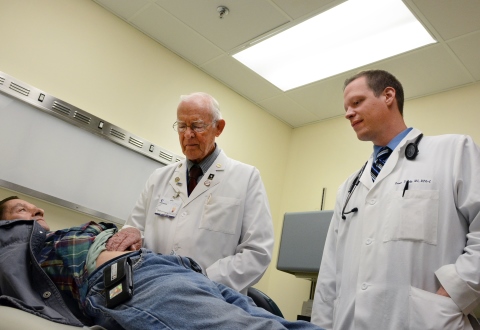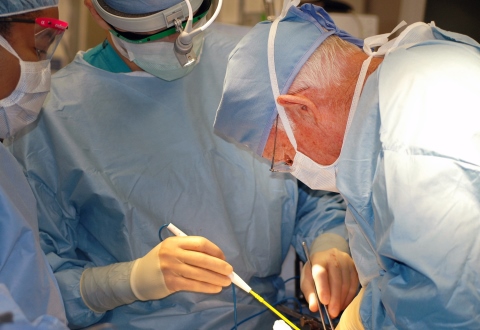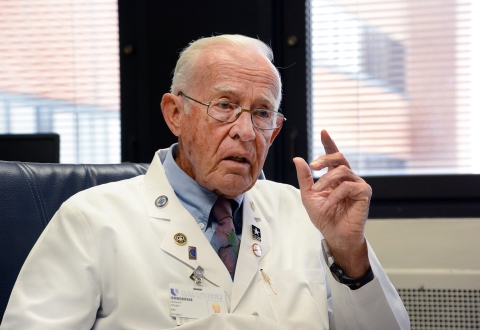Veteran Seigler Oldest VA Employee

VA Doctor Hilliard Seigler,MD (center), consults Veteran Norman F. Andrews during his most recent visit to the Durham VA Medical Center. VA Physician's Assistant Kevin Dendy watches Seigler examine the patient. Seigler is currently VA's oldest Veteran employee. Photo by Linnie Skidmore
This year, as we prepared to observe Veterans Day 2016 at VA, we reflected upon the dedicated employees across the country that have served both in the military and as civilians in the VA workforce. This journey took us to Durham, N.C., where we spent time with the VA’s oldest Veteran employee who can still be found in the hospital halls serving.
Making a difference in the world of medicine has been a life-long passion for Dr. Hilliard Seigler, who has been walking through the doors of the Durham VA Health Care System (VAHCS) to his research laboratory and surgical clinic since 1967. The retired Army Colonel is the VA’s oldest Veteran employee and, although quietly modest about his civilian and military career successes, is not shy about his commitment to serving Veterans; the VA’s strong relationship with its Duke University affiliate; and teaching medical students and residents on surgical rounds how to best care for the Nation’s heroes.
Regardless of whether Seigler is discussing his military, VA or Duke position, he unequivocally makes it known that interconnected relationships have been the foundation of all his careers. Volunteering for military service in 1961, Seigler served in the 3274th U.S. Army Hospital in Durham, N.C., trained with the 5th Medical Brigade and headed to Fort Bragg’s Womack Army Medical Center to treat patients each time the troops deployed. He said that serving in the military and having VA and Duke careers was ideal, helping him to better understand both missions which have led to exceptional outcomes.
“I began as a general surgeon in the military,” he said, adding he was fortunate to receive valuable training that forged a greater awareness as to the relationship between the military and industry. “I taught at a variety of DoD medical centers, to include my specialty in transplants, because the military was just getting into that and this benefitted everyone.”
During his 49 years at VA’s Durham Medical Center, Seigler has bridged the field of Immunogenetics between VA and Duke, exploring the relationship between the immune system and genetics for organ transplants since he graduated from the University of North Carolina as a trained surgeon. Then a science in its infancy, Seigler explained that transplants were just beginning to be performed (pointing out Duke’s first in 1965), and smiled as he recalled those exciting times of discovery.
“Defining and identifying what the human response would be to ‘immunogens’ ~ the antigens that can trigger the immune response to organs resulting in its acceptance or rejection ~ allowed me to pursue both academic and clinical paths,” Seigler said. “Research was very big, even back then, and we were very successful in getting research support and grants, which is why I began my career at the VA.”
“Seig,” as he is affectionately known by his friends and colleagues, praised the VA’s continuous commitment to funding research, which he’s been privileged to receive throughout his tenure.

Dr. Hilliard Seigler in the operating room in 2008. Seigler is a surgical researcher who has been with the Dept. of Veterans Affairs since 1966.
He pointed out that VA’s research funding is available only to VA employees, which is why many of the best researchers and clinicians in the world choose to wear the VA emblem on their lab coats. He further noted that collaboration between VA researchers and academic institutions can be a significant benefit to Veteran’s health care because it enables a direct connection from patient needs expressed in clinical visits to innovations developed in labs, which are then applied to address those needs. The VA notes that more than 60 percent of its researchers are care providers, making all of this possible, and Veterans remain central to the process throughout VA’s advancement of health care.
“Without question Seig has been one of our most productive and universally respected surgeons for many years,” said Curtis Lawson, Durham Surgical Services senior administrator. “Our patients, trainees and staff have benefited greatly from his wealth of knowledge, surgical expertise and sincere dedication to the VA. Truly he is a living, breathing National Treasure.” -- D Curtis Lawson- Senior Administrative Officer, Perioperative Services
“It’s important to remember that although VA may be a research program that focuses on the needs of our Veterans’, the VA’s tremendous successes have both changed the lives of Veterans, as well as had a positive impact on all mankind,” Seigler said, adding he’s been honored to be a part it. He makes no bones about it that this team effort that has driven the success of, not only his long career, but also that of VA clinicians across the country.
“I have always felt that our service members deserve the best medical care they can receive,” Seigler said, emphasizing that because of all of this, the Durham VAHCS meets that expectation every day. “The faculty at Duke University Medical Center is the same, residents are the same and we share these responsibilities of caring for these men and women equally, which is why we can say there is no better care in the world than here at the VA.”

Dr. Hilliard Seigler relates nuggets of wisdom during an interview at the Durham VA where he works. Seigler is the VA's oldest Veteran employee and has been with Durham VA since the mid-60's.
Seigler shared a recent story of a mentoring moment with one of those residents, who was treating a Veteran patient for skin cancer. During the exam he was coaching the resident about the importance of being thorough, to include recognizing signs that a patient might have received a transplant. During the discussion, the Veteran said he had indeed received a kidney 38 years earlier, was thankful to the VA, and would never forget the doctor. Seigler asked him the doctor’s name, then shared that he had done the surgery. The patient exclaimed with surprise, “My gosh ~ you look older!” to which Seigler quickly replied with a chuckle, “As do you!”And with this same enthusiasm, the 82-year-old doctor is not shy about debunking any misinformation on the street about the VA whenever he has an opportunity. Seigler stated with conviction that Veterans can trust the VA and be confident that it’s because of these committed relationships that they are being treated by the cream of the crop, and he is always prepared to share VA successes to emphasize that point. Whether about how he and his Duke colleagues determined why a transplant was rejected, or how the team constructed a “care map” to ensure optimal care coordination following a heart or kidney in the VA operating room, Seigler is passionate about setting the record straight.
“I have enjoyed my VA career,” Seigler concluded, as he paused to adjust the black and gold Army pin on his VA lab coat. “I believe in this mission and the dedicated people who are doing it.”
















